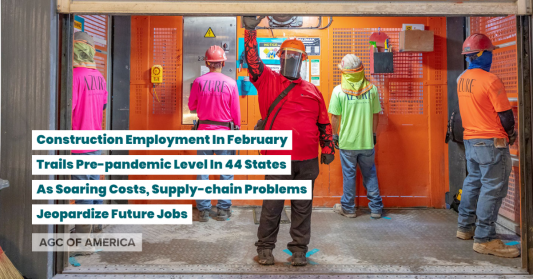
Texas, Louisiana Have Worst Job Losses Since Pandemic Struck, While Utah, Idaho Gain the Most; Association Issue Inflation Alert and Urges Immediate Relief on Tariffs, Examination of Supply Barriers
Construction employment in February remained below pre-pandemic levels in all but six states, according to an analysis by the Associated General Contractors of America of government employment data released today, while soaring materials costs and supply-chain problems threaten future employment. The association issued a Construction Inflation Alert detailing the problems and urged a rollback of tariffs and other supply impediments.
“Today’s figures show most states are still far from recovering the construction jobs lost a year ago,” said Ken Simonson, the association’s chief economist. “The overall economy is recovering, but huge price spikes and ever-lengthening delivery times threaten to set construction back further.”
The association’s new inflation alert documents a wide variety of materials undergoing steep and frequent price increases and delivery delays, Simonson noted. This combination threatens to hold up the start or completion of numerous projects and add to the downward pressure on construction employment, the economist warned.
Seasonally adjusted construction employment in February 2021 was lower than in February 2020—the last month before the pandemic forced many contractors to suspend work—in 44 states and the District of Columbia. Texas lost the most construction jobs over the period (-56,400 jobs or -7.2 percent), followed by New York (-41,100 jobs, -10.1 percent), California (-35,000 jobs, -3.8 percent), Louisiana (-20,400 jobs, -14.9 percent), and New Jersey (-18,200 jobs, -11.1 percent). Louisiana experienced the largest percentage loss, followed by Wyoming (-14.0 percent, -3,200 jobs), New Jersey, New York, and West Virginia (-9.3 percent, -3,100 jobs).